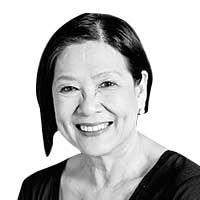Dad, I do not know you well, but...

Late one afternoon I took a yellow candle, lit it and set it in the center of my dark living room. It added warmth, like your embrace when I was a newborn baby. It is your 67th death anniversary.
I sigh. I love you more and more each year and yet I do not know you well. Once I must have known your scent even if I do not remember it. How much I do not remember!
It is my father’s death anniversary. He was home during World War II and according to my mother he took care of me for the six months we were both alive. I must have looked directly in his eyes, smiled, giggled, laughed. Dad, you were so good-looking. I know this from the two photographs I have with you. One is framed beside my bed. I am sitting on your lap — big round eyes, fat cheeks, mouth in a pout, my hair, straight like yours, standing proudly reaching to tickle your chin. The other shows me sitting in a baby carrier, like a little chair on your chest, strapped to your shoulders. These two photographs are my treasures of you.
I do not remember desiring you so much when I was small, not even as I was slowly growing up, but since I turned 50 — and that was many years ago — you are a presence I long for more and more. I want to get to know you much better.
My mother wanted me to call you Pappy but that never sat comfortably with me. Now I call you Dad. And for many decades now I have always remembered your birthday and your death anniversary. I always light a candle and sit with my memories of you.
For many years I was so sorry that you had to die the way you did. The Japanese took you to the Masonic temple and shot you dead with your father-in-law, your brother-in law, your cook and a few other men from our family. Also a lot of other men. They shot you at the 11th hour, the night before the liberation of Manila. We just never saw you again. We did not even have graves for any of you.
You know I have a Kindle, one of those electronic books — a gift from a friend. Lately I was downloading books and accidentally downloaded Unbroken: A World War II Story of Survival, Resilience and Redemption by Laura Hillenbrand. I don’t know why I ordered it when, since I was in my late 30s, I have refused to read or watch anything on wars. I think it was because they killed you in a war and I hated the Japanese for what they did to our family. But all that hatred I had forgotten and forgiven to the extent that these days I love Japanese food. Balance that with the fact that more and more I have been spending time looking out of windows and wondering — why did my father die so young? What kind of a life would he have lived if he hadn’t been killed?
Now I have my answers. Unbroken is a book about the Prisoners of War (POWs) of World War II and the atrocities the Japanese committed against them. They all lost an average of 61 lbs., having barely anything to eat daily except a little rice and barley, some seaweed. They spent their days sick — tuberculosis, dysentery, beriberi, malaria, anemia, malnutrition, festering wounds.
“The physical injuries were lasting, debilitating and sometimes deadly,” Laura Hillenbrand writes. “A 1954 study found that in the first two postwar years … POWs died at almost four times the expected rate for men of their age, and continued to die at unusually high rates for many years … the emotional injuries were much more insidious, widespread and enduring … former POWs committed suicide 30 percent more often than controls.”
How cruel and mean the Japanese were. They would take their prisoners and make them eat their feces. They would hit them with everything they had — belts, buckles, sticks, guns. Later when the POWs were free, they would have nightmares, hallucinations. They lived tormented, ruined lives. They walked around filled with rage. Nights they would have nightmares. They drank themselves to death.
Dad, this is a beautiful book. It makes me experience parts of the war that took you and finally makes me a bit grateful that at the end of it, you were killed because if you had lived probably you would have been tormented for a long while. But it also revives in me a terrible dislike for the Japanese who did all that evil. We must not forget the evil they committed against all the people they took as prisoners. I cannot forget that I was just a baby when they took my father away. That, to me anyway, is unforgivable.
Anyway, Dad, I do not know you well. Nevertheless I am starved for your affection and look forward to the day when I cross over and meet you face-to-face for the first time.
* * *
I would like to apologize to all who missed my column last week. Life overwhelmed me and I forgot my deadline.
Please text your comments to 0917-815-5570.



















